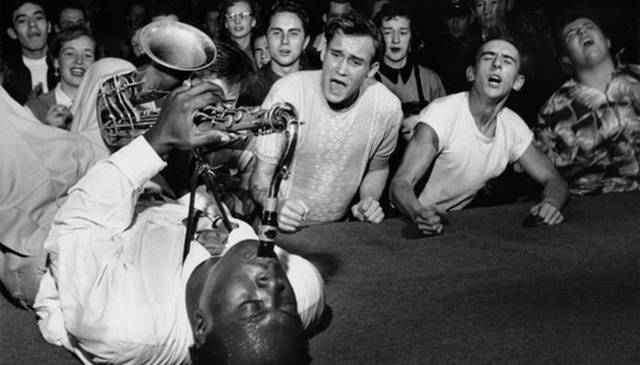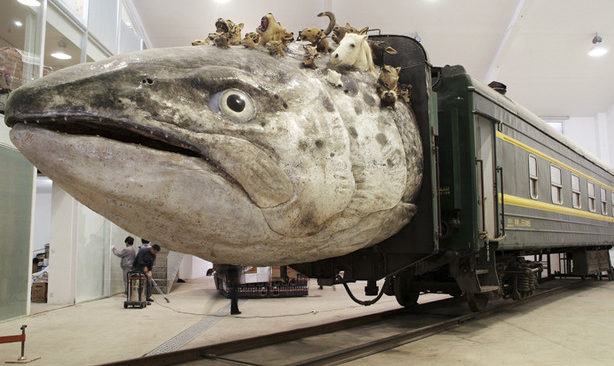In The Man From Beyond, our acting style is like jazz. We have a set structure and certain beats to hit, but the cast interprets the tune a little differently every time to fit our audience’s behavior and our own impulses in the moment. After a performance this weekend with a talkative group, Brad Winkler gushed, “I was scat-singing that whole scene!” Which, like jazz, feels magical.

Here are a few ways we’re using the concept of responding to reality—that thing that just happened—to enhance immersion.
Suddenly, a theme
Recently Strange Bird Immersive had the pleasure of hosting Jessica Goldman of the Houston Press (read her review of the show here). Early in the experience, I looked over my shoulder at her, a classic “clocking of the audience.” Her friend grinned and warned me, “Don’t trust her.” Daphne responded, “My dear, I don’t trust anyone. I’m a medium. I’ve learned that over time.”
Whenever I get interesting material from the audience, I try to call back to it, even beyond the immediate response. I saw an opportunity to thread the concept of “trust” through other moments in my scene work, so this simple comment grew into a larger and totally original theme that night, highlighting Daphne’s vulnerability with her audience. It was neat—and it’ll never happen again. That’s special.
Audience Care
Not many immersives have the luxury of being able to stop the show, but the structure of ours allows some wiggle room. An audience member once started coughing something fierce during Rules Hall. With a space so intimate, no one could ignore it—and why should we? I stopped the scene, asked if I could help, and she said “Yes, I’d like to use my inhaler. Could I go get it, please?” (We lock up personal belongings in the neighboring room on a voluntary basis).
“Of course, my dear.” Two minutes later, we resume, and everyone proceeds to enjoy a cough-free experience. Now that’s customer service. Eat your heart out, proscenium theatre!
Backstory becomes story (Spoiler level 1 for MAN FROM BEYOND)
Our other character in the show once had the players run out on him into the neighboring room, in a wild attempt to “solve his puzzle”—when the correct solution is a simple answer to his simple question. I’m not certain what they were hoping to find out there, but the actor had to get them back in the other room. He objected, “This doesn’t feel right. I don’t think I should be here. I should be back in the other room, with all my things.” He used the metaphysical logic that we created for the show to lure them back to where they needed to be. Brilliant.
I am all for writing backstory for your characters, with the guidepost being choosing details that raise the stakes of your text (it’s not imagination for imagination’s sake). But in immersive theatre, it’s even more important to know your character. That backstory may just become the story sometime.
What’s that noise? (SPOILER LEVEL 1 for MAN FROM BEYOND)
I once attended a performance of Hamlet a little too near MinuteMaid Park. That night’s baseball game ended in a fireworks show of 15-minutes-duration that landed smack-dab in the middle of Ophelia’s funeral sequence and the fencing duel. What could the actors do but ignore it? The poor audience too was tasked with pretending it wasn’t happening. An impossible task. The cast bravely ignored it, and the audience bravely strained their ears to here iambic pentameter instead of BOOM, but we all know our efforts failed that night. There are limits to what we can ignore.
Why didn’t they just halt the show?
But would that have been better? Which is the greater sin: to stop the momentum of Hamlet at its climax, or to forge ahead when you know no one can hear you? Honestly the only good solution available to them is to MOVE, which this company promptly did when a better location presented itself.
An infelicitous location is not a sin Strange Bird is immune to, either. The Silos at Sawyer Yards, where we installed The Man From Beyond, resides next to some active railroad tracks. Within our first week of build-out in the space, we realized we’d need to say something about trains. With player-responsive sound effects and a cleverly hidden sub-woofer to give the room a good rumble, teams could easily misinterpret the rumble of a train as positive feedback on a puzzle.

Solution? Acknowledge it. During Rules Hall, Madame Daphne declares, “Sometimes a train is just a train.” It elicits a laugh, but the best part comes when a train goes by, and players reassure each other out loud, “Hey! Sometimes a train is just a train!”

It’s the exact opposite of what a theatre gets to do. And guests love it. Rather than have a moment that kicks them out of the experience, we harness the inevitable appearance of a train to help blur the edges of our show with the wider world.
payoff
I’ve been talking about it for weeks. What does all this response amount to?
- Specialness: guests feel special because the performance is tailored to them.
- Relationship: you can’t connect with someone who’s express-training a script.
- Presence: immersive theatre gives the gift of bodily presence to the audience. Response confirms to the mind what the body knows: a sense of being there. When they push on something, and it gives, that only plunges them deeper in the immersion.
- Liminality: each time we own the reality, the boundary between the real world and our imaginary world blurs. As an immersive theatre artist, I want to create experiences that flirt with reality as much as possible. That paves the way for such transformative notions as, “I was a different person in there. Can I be that person out here, too?”
The world in Silos Studio #213 is real. And that’s our super-power.

